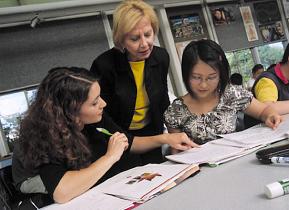Canada’s Education System: The Realities
When teachers write about their lives in schools, the expectation is that they will write about their funny or sad experiences with children. I know that teachers exhibit in their characters more altruism and good humour than most. But I discovered that there is another story about teachers, that women in education confront an androcentric culture in schools and school boards, and examining this has been the focus of my reflection in my retirement. I have no regrets about spending my life with young people, only gratitude and appreciation. However, there are issues to be addressed. I started teaching secondary school in the late sixties, at first at a co-ed public high school in a small town setting, then at my alma mater in Toronto, a school for girls with a reputation for academics. Eager to return to the city where I was born, I was hired in March to replace a nun who was leaving the community to teach my specialty, English language and literature. I was also given a class in religious education with her homeroom class. I had no idea what to teach them, and there was no one able to assist me with this. The Second Vatican Council had recently concluded, issuing a considerable transformation in theological understanding. The sisters were reluctant to perpetuate the past, but had no idea what curriculum should replace it. By chance, I attended a public meeting of Catholic parents concerned about what their children were learning in Catholic schools. Although the meeting took place in a parish hall, I soon realized that all these people were connected with St. Michael’s College, the Roman Catholic College affiliated with the University of Toronto, and therefore able to bring a critical and articulate consciousness to bear. There were a few priests present, of the educated and liberal variety. I remember that no one talked about sex education. But there was concern expressed about the power of the mass media and the superficial values it legitimated, contrary to those these faithful Christians were advancing at home. I got up and expressed my concern about the lack of direction in the religious education program. They all looked dumbstruck. A week later, a former principal of mine at St. Joseph’s came to the school to see me about enrolling in a new religious studies course at St. Mikes that she had encouraged after returning from study at Louvain in Belgium, noteworthy for its progressive theological tradition. Discouraged by everyone I knew, I decided to take the challenge, and began a graduate program in religious education. Not only did the board pay for my tuition, they also paid my salary for the year. I transferred out of my graduate work in English and entered an internal ecclesial monastic Catholic world. I spent the next twenty-seven years of my career in the classroom in different schools, focused on the religious education curriculum: recent scripture studies, the nature of sacramentality, the world religions, family life education, Catholic social teaching, personal and social transformation. I also spent a lot of my free time working in progressive Catholic, union, and community groups, all committed to an active participation on various justice issues. In that culture, values of gender equality, mutuality, collegiality, personal initiative, spirituality, risk and intellectuality were taken for granted. These were not the values of the people I worked with in different schools, where regressive Catholic conservatism ruled, where Catholic life was defined by bourgeois values of consumption and upward mobility, and ethical conduct continued to be equated with little more than sexual morality. But I still had my larger activist ecumenical community to support me and I never felt isolated in my more demanding expectations of a socially committed religious life. Until I went into administration, educational leadership. I was encouraged to do this by a friendly superintendent, and after two years of academic preparation and a demanding screening process, soon realized that I had entered a world of very different values. It was confusing because all these people had graduate degrees, were intelligent and devoted to education, and spoke a Catholic educational idiom. From the second week of my arrival at my first appointment, a very good suburban Catholic secondary school in Toronto, I was harassed by the principal, a gay man and former priest who was convinced that I too was gay but in denial as he had been for most of his life. That an interesting and multi-faceted woman might not marry to satisfy social convention was foreign in his world. My attempts to dissuade him were unsuccessful until he learned that I had reported him eight months later to someone more senior. On the positive side, he was the only person among five principals I would experience who showed any interest or confidence in my skills and development. In a seven-year period, I transferred to four different secondary schools, looking for a mentor I could trust but finding only a culture where values of competition, social and institutional status, power and control superseded the counter-cultural Christian values that had dominated and shaped my life hitherto. Tales Out of School is a professional memoir that attempts to describe the world of Catholic education in Toronto from the liberating influences of my childhood to the sadness of those last seven years. I came to understand how constrictive to female flourishing Catholic educational cultures continue to be, a place where female talent and experience is easily sacrificed to male privilege and to hierarchical positioning. I retired as soon as I could, eager to escape that backward, disappointing world where my cherished social Catholic values, surely the essence of Catholic leadership, were regarded as silly and idealistic, if not incomprehensible, and where the secular values of society were replicated without thought. This book is for the next generation of leadership. I hope that they will bring a more developed and informed consciousness to this important and challenging task. Linda Marie Arbour, MRE, Med, graduated from McGill University. She spent thirty-four years as a teacher and administrator in the Catholic public secondary schools of Toronto. Now retired, she continues to live in Toronto
About the Writer:
Comments
There are 0 comments on this post















